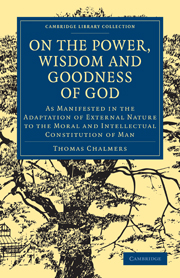 On the Power, Wisdom and Goodness of God
On the Power, Wisdom and Goodness of God Published online by Cambridge University Press: 29 August 2010
1. The first step towards the aggregation of men into a community, or the first departure from a state of perfect isolation, could that state ever have subsisted for a single day, is the patriarchal arrangement. No sooner indeed is the infant creature ushered into being, than it is met by the cares and the caresses of those who are around it, and who have either attended or welcomed its entry on this scene of existence—as if, in very proportion to the extremity of its utter helplessness, was the strength of that security which nature hath provided, in the workings of the human constitution, for the protection of its weakness and the supply of all its little wants. That there should be hands to receive and to manage this tender visitant, is not more obviously a benevolent adaptation, than that there should be hearts to sympathize with its cries of impotency or distress. The maternal affection is as express an instance of this as the maternal nourishment—nor is the inference at all weakened, by the attempts, even though they should be successful, of those who would demonstrate of this universal fondness of mothers, that, instead of an original instinct, it is but a derived or secondary law of our nature. Were that analysis as distinct and satisfactory as it is doubtful and obscure, which would resolve all mental phenomena into the single principle of association—still the argument would stand.
To save this book to your Kindle, first ensure [email protected] is added to your Approved Personal Document E-mail List under your Personal Document Settings on the Manage Your Content and Devices page of your Amazon account. Then enter the ‘name’ part of your Kindle email address below. Find out more about saving to your Kindle.
Note you can select to save to either the @free.kindle.com or @kindle.com variations. ‘@free.kindle.com’ emails are free but can only be saved to your device when it is connected to wi-fi. ‘@kindle.com’ emails can be delivered even when you are not connected to wi-fi, but note that service fees apply.
Find out more about the Kindle Personal Document Service.
To save content items to your account, please confirm that you agree to abide by our usage policies. If this is the first time you use this feature, you will be asked to authorise Cambridge Core to connect with your account. Find out more about saving content to Dropbox.
To save content items to your account, please confirm that you agree to abide by our usage policies. If this is the first time you use this feature, you will be asked to authorise Cambridge Core to connect with your account. Find out more about saving content to Google Drive.